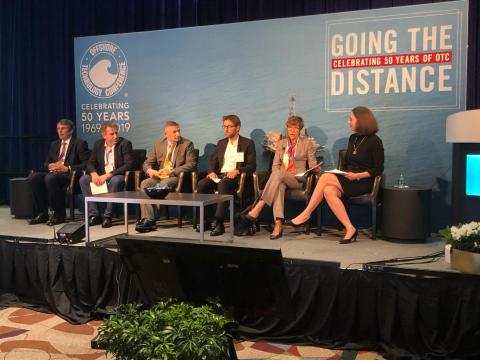OTC Conversations: Thoughts from the French Offshore Service Industry
Published May 09, 2019 by Sarah Hunter
In celebration of the 50th anniversary of Houston’s world-renown Offshore Technology Conference, Evolen, the industry association for the French oil and gas service sector, and the French-American Chamber of Commerce co-hosted a series of panel discussions on the development the French oil industry on May 7.
Evolen is the umbrella organization for over 200 French oil and gas service companies, both public and private, and this was one of nine Around the World sessions highlighting an oil and gas topic from a particular country. This session highlighted French technology and presence in the oil and gas sector worldwide. Leaders of the French offshore services industry participated in discussions centered around exploration and discovery, development, and looking towards the future.
Here are some of the key takeaways from the event:
On Curbing Emissions
Michel Hourcard, President and CEO of TOTAL E&P Americas, acknowledged the oil and gas industry’s critical role in reducing emissions, and highlighted the role of natural gas in the energy transition. The industry in France in particular is striving to reduce its carbon footprint by lowering methane emissions in oil and gas extraction and eliminating the use of flaring.
Hourcard also noted that one of the main issues the industry faces involves accessibility and public perception: “People need to understand what we do so that we are able to attract the best talent." He stressed the importance of becoming more environmentally friendly to improve the industry’s reputation and continue to attract young, digitally skilled talent.
On Issues the Industry Will Face in the Next Two to Five Years
Panelist Sophie Zurqiyah, CEO of geophysical services company CGG, noted that a major challenge is the increasing amount of data in an industry whose major players have historically operated in silos. The digital age is starting to bring geologists, engineers, petrophysicists, and others together in a way that they had not been previously. The industry is faced with a new challenge of how to bring them together. Trying to integrate the capture, storage and analysis of massive amounts of data across the oil and gas value chain, from the seismic data used in identifying and siting a new well to the reams of data gathered by smart drillbits.
On Digitization and the Influx of Data
Olivier Peyret, President of Schlumberger France, discussed two key areas around innovation: digitization and open innovation. The industry is faced with a fundamental revolution with the advent of cloud technology. His company has decided to send all its data to the cloud, noting that co-location of all data and infinite computing power were keys to finding new opportunities.
The second challenge revolves around open innovation. Previously, around 75% of all R&D spending came from large companies, with only 3% coming from small and medium-sized enterprises. Today, however, around one third of it comes from large companies, with another third coming from small- and medium-sized ones. Peyret noted that large companies must be connected to this new world and be willing to work with smaller companies or risk missing the next innovation.
On Changing Workforce Needs and the Generational Gap
One of the key challenges facing the industry is the massive influx of new talent that tend to be more technically skillful than the industry’s incumbents. The panelists all acknowledged the need to “reskill” their workforce – not just the specialists, but entire organizations so that employees are not left behind in this new era of big data and digitization.
Despite these changes, the panelists all agreed on one thing: digital skill, coupled with domain expertise, are the keys to success in this industry. Peret closed out the panel by acknowledging: “Old experts do come with data. Pair their experience and industry knowledge with young data scientists and you will have dynamite”.
Fifteen French companies were represented on the panel. Click here to view the full list.
Visit the Greater Houston Partnership’s Energy Committee page for more on how the organization is working to maintain Houston’s position as the Energy Capital of the World.
 The Houston Report
The Houston Report




















